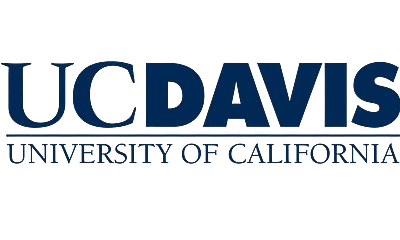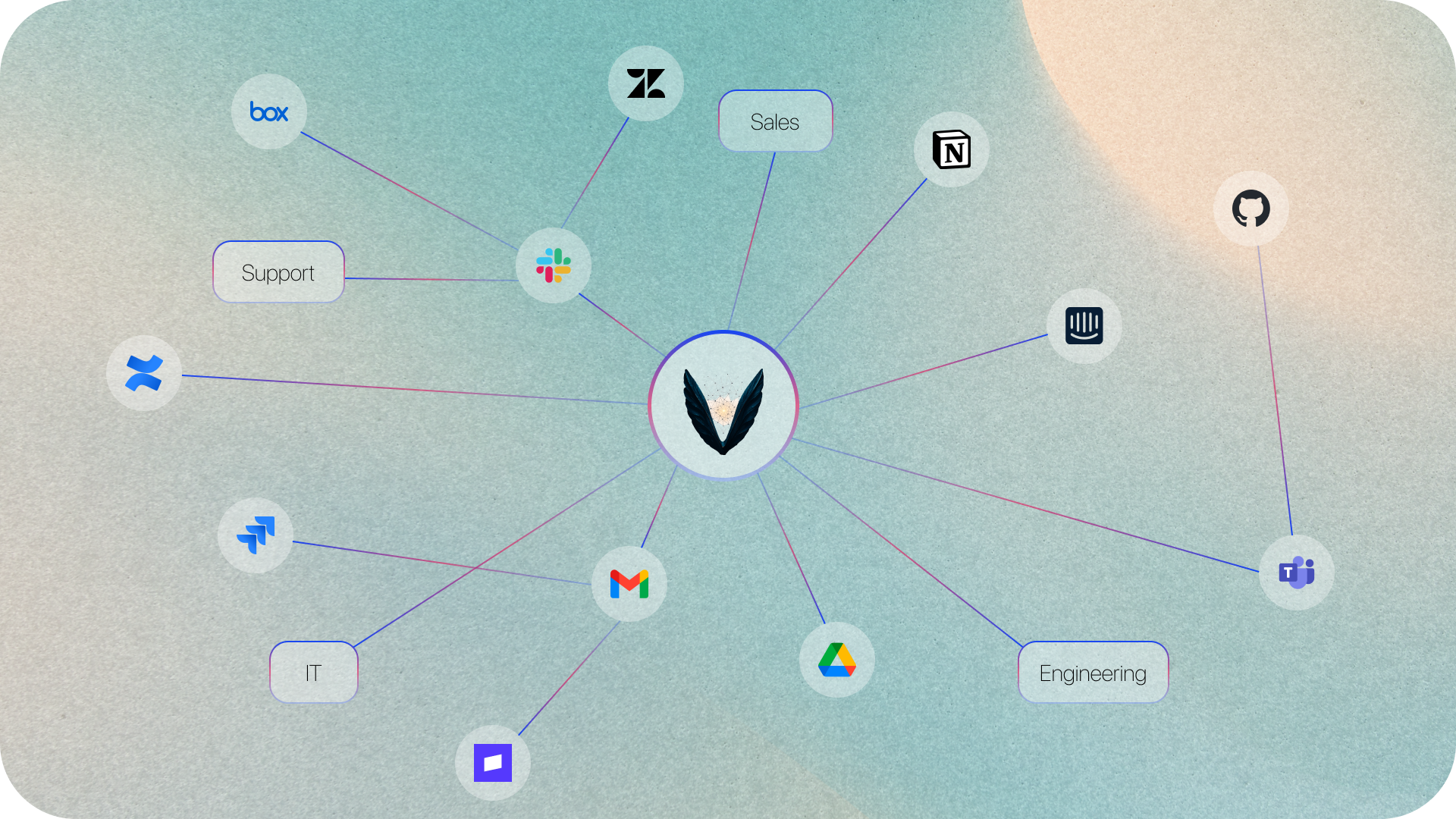AI Deep Reasoning
for your Data
HybridRAG retrieval with multi-hop reasoning and per-claim citations
Trusted by developers at

Why Traditional AI Fails Your Team
Your company data lives in dozens of disconnected apps. No AI can see across all of them—until now.
Your Data Is Scattered Everywhere
Slack, Notion, Drive, Salesforce, Zendesk, Jira... Your team's knowledge is scattered across dozens of disconnected tools.
Search Isn't Reasoning
Most AI tools retrieve text snippets based on keyword matching. They find documents—but can't connect the dots. Complex questions that require tracing relationships across your data get fragments, not answers.
Building This In-House? Don't.
Custom RAG pipelines take 6-12 months, require ML expertise, and you'll still spend months building integrations. Your engineers should be shipping products, not infrastructure.
One Connected Knowledge Base
All Your Apps. One AI That Understands Them.

Multi-Hop Reasoning
AI That Connects the Dots Across Everything
Ready Today, Not Next Year
Skip the Science Project. Start Asking Questions.
from vrin import VRINClient
# Initialize with your API key
client = VRINClient(api_key="vrin_...")
# Insert knowledge from your documents
client.insert(
content="Q4 roadmap includes...",
title="Product Roadmap 2025"
)
# Query with multi-hop reasoning
response = client.query("What's our Q4 roadmap?")
print(response["summary"]) # AI-generated answer
print(response["sources"]) # Source documentsSee VRIN in Action
Watch how VRIN transforms AI applications with persistent memory, user-defined specialization, and expert-level reasoning.
From Raw Data to Expert Insights
VRIN's HybridRAG architecture transforms fragmented information into persistent, intelligent memory.
Connect & Ingest
Universal Data Integration
VRIN ingests from any source—APIs, databases, documents, conversations, Slack threads, customer tickets. No complex ETL pipelines. No data movement. Just simple REST API calls that work with your existing infrastructure.
What's inside VRIN?
Teams choose VRIN because it transforms AI from forgetful assistants into expert systems with persistent memory and deep reasoning.
Facts-First Memory
Knowledge graphs that store facts with provenance, not just embeddings. Build institutional memory that compounds over time.
Multi-Hop Reasoning
Constraint-solver engine that traces relationships across documents and time to answer complex 'why' questions.
AI Specialization
Define domain experts for sales, engineering, finance with custom reasoning patterns and knowledge focus areas.
HybridRAG Routing
Intelligent query analysis routes to optimal path: vector search for similarity, graph traversal for reasoning.
BYOC/BYOK Security
Deploy in your cloud or ours. Complete data sovereignty, zero vendor lock-in, enterprise-grade isolation.
Temporal Consistency
Track how facts evolve over time with automatic conflict resolution and versioning for changing information.
Proven Across Industries
Vrin's memory orchestration platform delivers value across diverse sectors, with specialized demos and case studies.
Healthcare
Transform patient care with persistent memory for clinical conversations, treatment history, and care coordination.
Finance
Enhance financial AI with persistent memory for client relationships, transaction history, and regulatory compliance.
Legal
Revolutionize legal AI with memory for case histories, precedent tracking, and client communication context.
Healthcare Industry Demo
Watch how VRIN transforms AI interactions with persistent memory in the Healthcare Industry.
See how VRIN enhances patient care with persistent clinical memory and specialized AI reasoning
Beyond Traditional RAG Systems
VRIN's hybrid architecture combines the best of vector search and graph traversal, enhanced with user-defined specialization for unmatched domain expertise.
Traditional RAG
- Vector-only retrieval
- No domain specialization
- Limited context understanding
- 68.18 F1 performance
Graph RAG
- Graph-only traversal
- Better for multi-hop queries
- Still lacks specialization
- 71.17 Acc on complex tasks
VRIN Hybrid
- Intelligent query routing
- User-defined AI experts
- Multi-hop reasoning
- 71.17+ Acc with specialization
Architecture Comparison: Traditional vs HybridRAG
Technical analysis of different RAG pipeline architectures, comparing performance, limitations, and architectural components across three distinct approaches.
Traditional RAG Pipeline
Standard vector-based retrieval with limited context understanding and no domain specialization.
System Architecture
Graph RAG Pipeline
Relationship-based traversal system optimized for multi-hop queries but lacks user-defined specialization.
System Architecture
VRIN HybridRAG Pipeline
Intelligent query routing with user-defined AI experts, combining vector search and graph traversal.
System Architecture
Architecture Performance Summary
Comparative analysis across key performance metrics
| Architecture | Accuracy | Speed | Specialization | Multi-hop |
|---|---|---|---|---|
| Traditional RAG | 68.18 F1 | ~2-5s | None | Limited |
| Graph RAG | 71.17 Acc | ~5-10s | None | Good |
| VRIN HybridRAG | 71.17+ Acc | <1.8s | User-Defined | Advanced |
Seamless Integration
Drop Vrin into your existing stack with simple APIs. No complex setup or migration required.
LLM Providers
OpenAI, Anthropic, Cohere, Google AI
Frameworks
LangChain, LlamaIndex, AutoGPT
Cloud
AWS, Azure, GCP, Vercel
Enterprise
Salesforce, SAP, ServiceNow
Choose Your Intelligence Level
From individual developers to enterprise deployments, VRIN scales with your needs. All plans include our revolutionary user-defined AI specialization.
Perfect for developers and small teams getting started
What's Included:
- 100k chunks / 100k edges
- 5k queries/month
- Shared HybridRAG infrastructure
- Basic memory & CBOM
- API key authentication
- CSV/S3 connectors
- Community support
For growing teams that need dedicated infrastructure
What's Included:
- 2M chunks / 3M edges
- 100k queries/month
- Dedicated indices
- Full CBOM & TTL
- Basic RBAC
- + Postgres/Drive connectors
- Email support (48h SLA)
- Extra storage/queries available
For enterprises requiring security and compliance
What's Included:
- 10M chunks / 15M edges
- 500k queries/month
- Dedicated + VPC peering
- Full + compliance exports
- SSO/SAML + SCIM
- + Slack/Jira/Confluence
- Priority support (8-12h SLA)
- Compliance exports, private LLM
Custom solution for large-scale deployments
What's Included:
- Custom (100M+ chunks; 150M+ edges)
- Custom queries (SLA'd)
- Private/VPC or on-premises
- Full + auditor packs
- SSO/SAML, SCIM, data residency
- All + custom connectors
- Dedicated TAM & DSE
- On-prem, managed upgrades
All Plans Include
Revolutionary capabilities that set VRIN apart
Core Intelligence
- User-defined AI specialization
- Multi-hop reasoning across documents
- Smart deduplication (40-60% savings)
- Temporal knowledge graphs
- Lightning-fast fact retrieval (<1.8s)
Enterprise Features
- Complete audit trails
- Explainable AI responses
- High-confidence fact extraction
- Cross-document synthesis
- Production-grade security
Questions about pricing or need a custom solution?
ROI Guarantee: VRIN typically pays for itself within the first quarter through reduced engineering costs, faster time-to-market, and superior analysis quality.